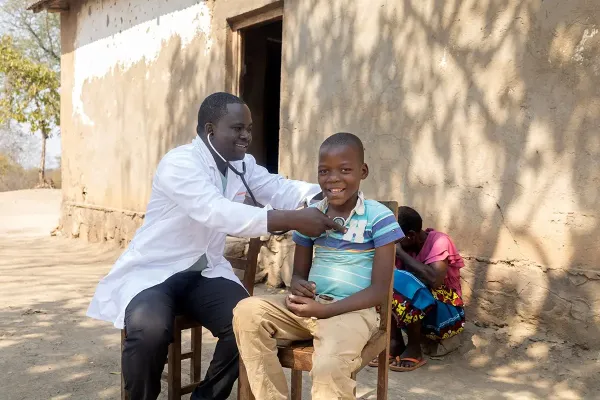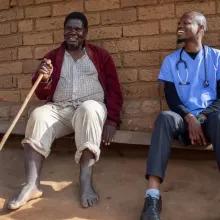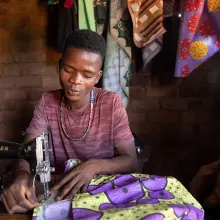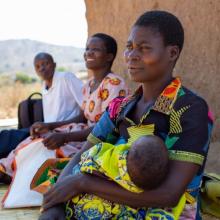Cardiovascular diseases (CVDs) are among the leading causes of death in the world, taking an estimated 17.9 million lives each year, with one-third of deaths occurring in people under the age of 70. These diseases, including coronary artery disease, rheumatic heart disease, pulmonary embolism, heart valve disease, and more, encompass a range of conditions that affect the heart’s structure and ability to function.
In sub-Saharan Africa, the prevalence of risk factors for CVD is high, and access to specialized care is limited. With a staggering ratio of just one cardiothoracic surgeon for every 14.3 million people, options for managing heart conditions in countries like Malawi are few.
Two Worlds Collide
Promise Douglas, a 9-year-old from Nyaiyaye Village in Malawi’s Neno District, and Vitalina Chaona, a 49-year-old from Gochi 2 Village in the Ntcheu District, had lost hope after years of struggling with severe heart diseases.
Douglas, suffering a congenital heart defect, and Chaona, battling rheumatic heart disease, received inadequate treatment for their conditions until Abwenzi Pa Za Umoyo (APZU), as Partners In Health (PIH) is known in Malawi, stepped in.
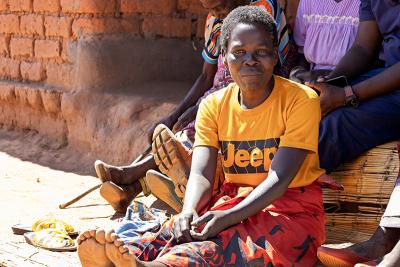
Vitalina Chaona and her family share moments together during a medical home visit at their residence in Ntcheu following a successful heart surgery in Tanzania.
Photo by Innocent Nyambaro / Partners In Health
For Chaona, a shortness of breath and discomfort in her chest coupled with a general feeling of weakness prompted a visit to the PIH-supported Neno District Hospital in September 2021. There, she was examined by Medson Boti, a clinician specializing in chronic care for severe noncommunicable diseases. After thoroughly assessing Chaona, Boti diagnosed her with rheumatic heart disease, a condition that begins with a bacterial infection and leads to complications that affect heart valves.
Chaona recalled, “When I was first informed that I had been diagnosed with this heart condition, I was initially worried; but I was relieved that at least I could be put on pain relief medication, refilled every month from Neno District Hospital. PIH Malawi also supported me with transportation during my monthly visits to the facility.”
“We immediately started treating the symptoms on Vitalina,” Boti said, “then consulted a cardiologist who conducted a further assessment on her and concluded that she could benefit from surgery.”
Around the same time and within the same country, another patient experienced frightening symptoms as well. Diagnosed with Tetralogy of Fallout at Lisungwi Community Hospital in February 2022 and again at Queen Elizabeth Central Hospital in January 2023, Douglas experienced difficulties breathing and eating, blue-tinged skin, fainting, an inability to exercise, and heart palpitations. Doctors concluded he had a rare condition caused by a combination of birth defects that change the way blood flows through the heart.
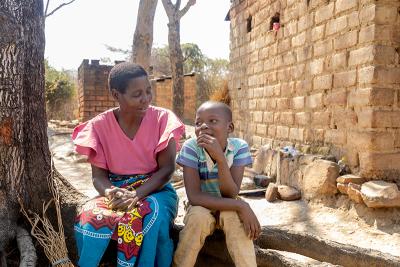
Promise Douglas and his grandmother Crea Karedzera in Malawi. Douglas was diagnosed with Tetralogy of Fallot, a rare heart condition.
Photo by Innocent Nyambalo / Partners In Health
“We facilitated further assessments with cardiologists and a recommendation was made for him to undergo surgery,” Boti said. “Cardiac surgeons from Tanzania who were in Malawi visiting at the time made similar recommendations, and he was immediately put on list of those waiting to go for surgery.”
Seeking Treatment Abroad
Both Chaona and Douglas were treated with medications to manage their symptoms. However, due to limitations in cardiac care available in Malawi, the two required further treatment outside the country.
Boti explained: “Currently, we are unable to conduct open heart surgery in Malawi. We only have medications that improve the symptoms of heart diseases. Patients with heart conditions are sent outside the country for surgery.”
APZU identified Jakaya Kikwete Cardiac Institute in Tanzania as the most suitable facility for the lifesaving surgical procedures both patients needed, and a carefully planned trip was arranged.
Accompanied by Nurse Dester Nakotwa for support, the hopeful pair set off for Tanzania by way of Chileka International Airport in Blantyre in November 2023.
Uncertain of the procedure’s outcome and desperate for relief from the ongoing pain her condition inflicted, Chaona nervously anticipated her surgery.
“When I was informed about the surgery in Tanzania, I was excited but scared at the same time,” she said. “I was reluctant as I was not sure of the outcome of the procedure; however, I needed to be free from the pain I had been feeling for over three years. When we arrived, I was scared after some assessments, but I was assured that I was going to get better after the treatment.”
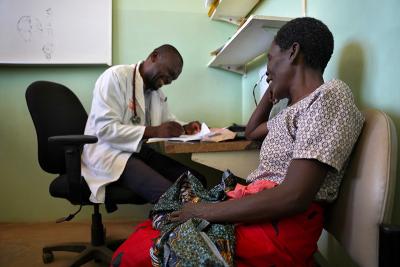
Medson Boti, a clinical officer, conducting a check-up on Vitalina Chaona at Neno District Hospital in Malawi.
Photo by Joseph Mizere / Partners In Health
The patients stayed at the health facility for about a week before their procedures, as doctors conducted tests in preparation and to ensure readiness. Afterward, they remained in the hospital’s intensive care unit for an additional two weeks before returning to Malawi. Each surgery lasted an estimated six to eight hours, and both were successful.
Recovery and Ongoing Support
Five months after surgery, APZU continued monitoring Chaona and Douglas, who showed significant progress. Boti, who is keeping a watchful eye throughout their recovery, is hopeful that the two will live normal lives.
“Overall, there has been great improvement on the condition of the patients following the treatment in Tanzania,” Boti reported. “For Promise, there is a lot that is expected of him as a child, and we are hoping that he will be able to grow healthy and reach his maximum potential.”
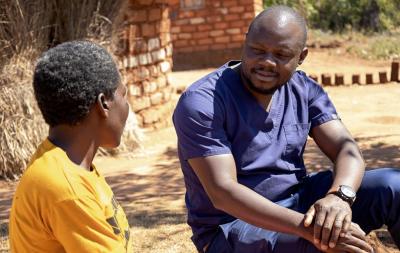
Dester Nakotwa, NCD Nurse, counseling Vitalina Chaona, during a home visit at her residence in Ntcheu. Vitalina, 45, underwent successful heart surgery in Tanzania with assistance from Partners in Health Malawi.
Innocent Nyambaro / Partners In Health
Zaniku applauded PIH for its role in facilitating high-quality care for patients with complex health conditions, saying: “The efforts of PIH in ensuring that patients have access to treatment outside Malawi is of very great importance, as we don`t have more advanced facilities that are able to perform heart surgeries including advanced laboratory services currently in Malawi.”
Expanding Cardiac Care
In 2018, PIH, in partnership with Malawi’s Ministry of Health, opened PEN-Plus clinics at Neno District Hospital and Lisungwi Community Hospital. These clinics provide decentralized care for severe NCDs through the integration of health services.
Both facilities address heart-related conditions through outpatient care, offering medication to help manage symptoms. People requiring surgery rely on government assistance and partner sponsorships to access treatment centers outside of the country.
The two facilities also treat type 1 and type 2 diabetes, asthma, sickle cell, stroke, deep vein thrombosis, and occupational lung diseases, among other conditions.
The success of the PEN-Plus clinics led to their expansion to Karonga and Salima Districts in December 2023, giving local health care providers the capacity to manage and treat both simple and complex NCDs at primary and secondary health care levels.
As of April 2024, there were 595 patients enrolled in Neno’s PEN-Plus clinic receiving advanced NCD care. Among them, 86 were seen through home visits due to physical challenges associated with their illnesses. There are four patients on the waiting list for cardiovascular surgeries abroad.
“On the other hand,” he continued, “I have personally examined Vitalina since her return from Tanzania and I can see some great improvements. She is now able to walk [and] breathe properly as compared to the period before surgery. I believe she will be able to resume some household chores as a woman in her home.”
According to Neno District’s noncommunicable disease (NCD) coordinator, Haules Zaniku, heart conditions are relatively common in the region, where facilities register at least three to five new patients every month. Frequently reported heart conditions include: cardiomyopathy, hypertension, and rheumatic and congenital heart diseases, normally caused by rheumatic fever, alcohol use, HIV, and other infections.
